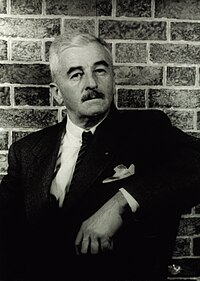William Faulkner
William Faulkner | |
|---|---|
 Faulkner in 1954, photograph by Carl Van Vechten | |
| Born | William Cuthbert Falkner September 25, 1897 New Albany, Mississippi |
| Died | July 6, 1962 (aged 64) Byhalia, Mississippi |
| Occupation | novelist, short story writer |
| Genre | Southern Gothic |
| Literary movement | Modernism, Stream of consciousness |
| Notable awards | Nobel Prize in Literature 1949 |
William Faulkner (born William Cuthbert Falkner), (September 25, 1897–July 6, 1962) was an American author. One of the most influential writers of the twentieth century, he was awarded the 1949 Nobel Prize in Literature. His reputation is based on his novels, novellas, and short stories. However, he was also a published poet and also was a screenwriter. He is now deemed among the greatest American writers of all time.[1]
Awards[change | change source]
Faulkner received the 1949 Nobel Prize for Literature for "his powerful and artistically unique contribution to the modern American novel." He donated a portion of his Nobel winnings "to establish a fund to support and encourage new fiction writers," eventually resulting in the PEN/Faulkner Award for Fiction. He donated another portion to a local Oxford bank to establish an account to provide scholarship funds to help educate African-American education majors at nearby Rust College in Holly Springs, Mississippi.
Faulkner won two Pulitzer Prizes for what are considered as his "minor" novels: his 1954 novel A Fable, which took the Pulitzer in 1955, and the 1962 novel, The Reivers, which was posthumously awarded the Pulitzer in 1963. He also won two National Book Awards, first for his Collected Stories in 1951 and once again for his novel A Fable in 1955.
In 1946, Faulkner was one of three finalists for the first Ellery Queen Mystery Magazine Award. He came in second to Manly Wade Wellman.[2]
Legacy[change | change source]
The PEN/Faulkner Award for Fiction has its name, in part, as a tribute to Faulkner, because he was one of the main inspirations of Mary Lee Settle, a founder of the PEN/Faulkner Foundation; Faulkner was an inspiration because he used his 1949 Nobel Prize money to fund awards for younger writers.[3]
In 1987, the United States Postal Service issued a 22 cent postage stamp in his honor.[4]
Selected writings[change | change source]
Novels[change | change source]
- Soldiers' Pay (1926)
- Mosquitoes (1927)
- Sartoris/Flags in the Dust (1929/1973)
- The Sound and the Fury (1929)
- As I Lay Dying (1930)
- Sanctuary (1931)
- Light in August (1932)
- Pylon (1935)
- Absalom, Absalom! (1936)
- The Unvanquished (1938)
- If I Forget Thee Jerusalem (The Wild Palms/Old Man) (1939)
- The Hamlet (1940)
- Go Down, Moses (1942). Episodic novel made up of rewritten previous published short stories.
- Intruder in the Dust (1948)
- Requiem for a Nun (1951)
- A Fable (1954)
- The Town (1957)
- The Mansion (1959)
- The Reivers (1962)
Short stories[change | change source]
|
|
|
Poetry[change | change source]
- Vision in Spring (1921)
- The Marble Faun (1924)
- A Green Bough (1933)
- This Earth, a Poem (1932)
- Mississippi Poems (1979)
- Helen, a Courtship and Mississippi Poems (1981).
References[change | change source]
- ↑ New York Times[permanent dead link], October 12, 2006:
- ↑ "Oregon Lit Rev website". Archived from the original on 2007-10-22. Retrieved 2008-10-02.
- ↑ Cite error: The named reference
schudelwas used but no text was provided for refs named (see the help page). - ↑ Scott catalog # 2350.
